List of heads of state of Etruria
| President of the United Transetrurian Federation | |
|---|---|
| Presidente della Federazione Transetruriana Unita Predsjednik Ujedinjene Prekoetruriska Federacije Predsednik Priljubljena Čezetruriska Federacija | |
| Style | The Most Excellent |
| Residence | Palazzo Orsini |
| Term length | Five years, unlimited term |
| Inaugural holder | Alessandro Luzzani head of state (President) under the constitution of 1917 |
| Formation | first: 1917 Constitution current: 2016 Constitution |
| Salary | $460,000 annually |
The United Transestrurian Federation in its history has had various heads of state under different regimes in its history. Since the declaration of the federal-republic in 1917 there has been XX heads of state of Etruria, of which XX constitutionally elected presidents and 1 elected First Citizen, X military dictators and X interim leaders. Since 1917 Etrurian heads of state also serve as head of government. Since 2016, the office encompassing both head of government and state has been officially renamed as First Citizen.
The pre-republican Etruria was dominated by the Kingdom of Vespasia, which was governed through an elected monarchy, drawn primarily from the ruling families of the pre-unification statelets, maritime republics, city-states and duchies. Following the political instability of the first two-decades of the 20th century, the monarchy was overthrown and a democratic federal republic was proclaimed, with the office of President being head of state and government. Etruria's political system is parliamentary in nature, with the President coming from the United Congress of Etruria and depending on its confidence to remain in office. Between 1917 and 1938, Etruria was ruled under its parliamentary system, however, following the country's political, economic and social collapse in wake of the "Great War", the system was supplanted by a military dictatorship under the State Commission for National Resurgence (CSRN).
Following the CSRN's defeat in the Solarian War in 1943, democracy was returned with the election of President Amintore Merzagora. However, renewed political instability and rising violence among ethnic minorities during the 1970s resulted in the return of military rule through the State Authority for Order and Peace (ASOP). The ASOP would rule continuously until 1983, when it voluntarily and peacefully returned power to democratically elected government. President Niko Zaninović was the first democratically elected to assume office in 1983. From 1983 until 2016, the Etrurian government would be dominated by a two-party system, with power alternating between the Etrurian Socialist Party and Etrurian Federalist Party. In 2016, in wake of growing dissatisfaction with the socio-economic and political situation in Etruria and the failed referendum on membership of the Euclean Community, Francesco Carcaterra of the populist Tribune Movement became President. Amendments to the constitution in 2016 were key to transferring several new powers to the office from the legislature, leading some to describe the 2016 constitution as having made a "compromised parliamentary-republic."
This is a list of the heads of state of Etruria, from the formation of the United Kingdom of Carinthia, Novalia and Vespasia in 1733.
Key
Monarchy
Military and non-partisan
Nationalist
Conservative
Liberal
Socialist
United Kingdom of Carinthia, Novalia and Vespasia (1736-1793)
| No. | Name | Reign start | Reign end | House | Marriage(s) Issue | ||
|---|---|---|---|---|---|---|---|
| File:Coat of Arms of the UKCNV.png King of the Kingdom of Carinthia, Novalia and Vespasia File:Coat of Arms of the UKCNV.png | |||||||
| 1 |  Adriano Augusto I (1710-1773) |
4th October 1736 | 13th May 1773 | Della Rovere | Caterina Maria (m. 1729 d. 1771) | ||
| Crowned King of the United Kingdom of Carinthia, Novalia and Vespasia following the successful conquest of both kingdoms between 1734 and 1736. He previously united the states of Vespasia, proclaiming the Kingdom of Vespasia in 1731. For the rest of his reign he focused on uniting the three peoples and solidifying his rule. | |||||||
| 2 | 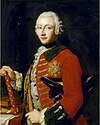 Adriano Augusto II (1740-1790) |
13th May 1773 | 6th August 1790 | Della Rovere | Lucrezia Guilia (m. 1761 d. 1790) | ||
| Eldest son of King Adriano Augusto I, focused much of his reign on supporting the arts and building the Royal Vespasian Navy. He is well documented for proposing and advocating a singular, uniting 'Etrurian' identity for his subjects. | |||||||
| 3 | 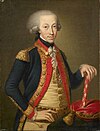 Adriano Augusto III (1766-1805) |
6th August 1790 | 2nd November 1793 | Della Rovere | Caterina Serafina (m. 1790 d. 1805) | ||
| Eldest son of King Adriano Augusto II, a popular reformer who sought to empower the lower classes while working to improve relations with Gaullica, successfully led efforts to crush a Novalian uprising. Died in 1805 in a hunting accident. | |||||||
| 4 |  Guilio Vittorio I (1776-1822) |
2nd November 1805 | 25th December 1822 | Della Rovere | Maria Terese (m. 1794 d. 1822) | ||
| Second son of King Adriano Augusto II, succeeded his brother following his death. Was a major patron of the arts and sciences, organised the Kingdom's first efforts at colonisation across the Solarian Sea. Led several successful campaigns against Novalian and Carinthian uprisings, while pressing for the conquest of Artis, this never attracted sufficient support among his court. Upon his death he requested in his last will and testament for his realm to be officially renamed to the Kingdom of Etruria. | |||||||
Kingdom of Vespasia (1822-1917)
| No. | Name | Reign start | Reign end | House | Marriage(s) Issue | ||
|---|---|---|---|---|---|---|---|
| File:Coat of Arms of the UKCNV.png King of the Kingdom of Etruria File:Coat of Arms of the UKCNV.png | |||||||
| 1 | 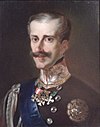 Guilio Vittorio II (1799-1851) |
25th December 1822 | 1st July 1851 | Della Rovere | Some foreign woman (m. 1834 d. 1850) | ||
| First King of the new Kingdom of Etruria, oversaw his father's request for a singular nation. He greatly enhanced the autonomy and freedoms of Carinthia and Novalia, while pushing still for Etrurian colonialism. | |||||||
| 2 | 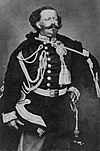 Guilio Vittorio III (1820-1878) |
1st July 1851 | 21st October 1872 | Della Rovere | Rosa Ofelia (m. 1845 d. 1878) | ||
| Hailed as King Guilio Vittorio the Great for leadership and command during the Etrurian-X War, Etrurian-Sarenian War and diplomatic successes. He was a major patron of industrialists and pioneers in the sciences. He personally oversaw the modernisation of Etrurian cities, including new roads, better housing, new schools and electrification. He decreed in 1870 the total ban on child labour and the expansion of male suffrage to literate working class workers. He was the first King to buried in the Altar of the Nation. | |||||||
| 3 |  Guilio Vittorio IV (1845-1901) |
21st October 1872 | 3rd May 1901 | Della Rovere | Alessandra Fiora (m. 1866 d. 1901) | ||
| Second son of King Guilio Vittorio III, following his brother's death at age 3. He expressed authoritarian proclivities and undermined his father's democratic reforms. Unwilling to cede more power to the Imperial Parliament, he aligned with landed elites in opposing and defeating democratic reform. He dramatically curtailed freedom of the press, created the Costita (All-Etrurian Extraordinary Commission). His reign contributed greatly to the eventual downfall of the monarchy in 1917. | |||||||
| 4 |  Guilio Adriano I (1868-1920) |
3rd May 1901 | 28th May 1917 | Della Rovere | Serafina Maria (m. 1866 d. 1901) | ||
| Eldest son of Guilio Vittorio IV, failed to heed the warnings of senior government officials that authoritarianism and a declining economy was undermining the monarchy. Unable and unwilling to support reforms or a reduce in the activities of Costita, he regularly replaced Prime Ministers throughout his reign. During the Winter Crisis of 1916, he regularly dismissed requests for negotiations between his government and republican aligned parliamentarians, eventually using force to shut down the Imperial Parliament of Etruria, culminating in the Etrurian Revolution in the summer of 1917. He and the House of Della Rovere was overthrown and he spent the remainder of his life on the island of San Marco until his suicide in 1920. | |||||||
First Republic (1917-1936)
| No | Picture | Name | Term | Tenure | Affiliation | ||
|---|---|---|---|---|---|---|---|
| 1 | 
|
Alessandro Luzzani (1849-1927) |
- | 10 November 1917 |
12 December 1923 |
Liberal Republicans | |
| Former speaker of the National Assembly under the Vespasian Monarchy. Elected President by the Constituent Assembly following the Etrurian Revolution, successfully oversaw the creation of the democratic federal republic. | |||||||
| 2 | 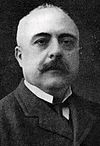
|
Guilio Augustino Schiattarella (1852-1940) |
- | 12 December 1923 |
3 July 1926 |
Liberal Republicans | |
| First President to be successfully elected. Schiattarella focused on expanding workers' rights, introducing assistance programmes for farmers and miners. Schiattarella also led efforts to develop education and combat illiteracy. Retired from politics at the end of his first and only full term. | |||||||
| 3 | 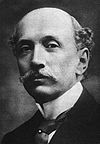
|
Vittore De Rossi (1851-1930) |
- | 3 July 1926 |
20 April 1927 |
Liberal Republicans | |
| A militant leader during the Revolution, he entered office advocating land reform and better social welfare for the poorest. However, he would later resign over Etruria's violent eviction from Denikert and the outbreak of the "Great War". | |||||||
| 4 | 
|
Aurelio Cesare Tozzo (1879-1942) |
- | 20 April 1927 |
3 June 1927 |
National Liberal Union | |
| Interim President following the resignation of De Rossi. | |||||||
| 5 | 
|
Fortunato Parlatore (1888-1965) |
- | 3 June 1927 |
3 July 1930 |
Catholic Traditionalist Party (a part of the War Coalition) | |
| 2 | 3 July 1930 |
11 November 1934 | |||||
| Becomes Etruria's "War Leader", oversees improved events on the Gaullican Front and orders the Etrurian Navy to begin operations in the Solarian and Mazdan seas aimed at interdicting and blockading Amathia, he resigns toward the war's end in hope of securing a stronger negotiator for the impending peace talks. Widely revered as the "Saviour of Etruria", consistently ranks as one of the most popular Etrurian leaders. | |||||||
| 6 | 
|
Marco Antonio Ercolani (1860–1938) |
- | 11 November 1934 |
1 April 1938 |
Catholic Traditionalist Party (a part of the War Coalition until 1936, then as civilian head of the Emergency Military Government (1936-1938) | |
| Ercolani oversaw the end of the Great War with Etruria on the victorious side. However, his government's total failure to secure any territorial concessions and the failure to even re-acquire territory lost during the War results in mass protests and collapse in support for the government. His decision to extend the Occupation of Aquila indefinitely is blamed for the main reason of the "Il Grande Tradimento" (Great Betrayal). The post-peace instability resulted in the Etrurian Military entering his government, replacing his cabinet with officers, turning him into a figurehead. His failure to re-take Etruria's Legation Cities during the Sarenian Reclamation in 1938 resulted in his indefinite overthrow by Ettore Caviglia. He was killed the same day when an unknown assailant threw him out of a forth floor window. | |||||||
Revolutionary Republic (1938-1946)
| No | Picture | Supreme Leader | Tenure | Picture | Leader Minor | Tenure | Affiliation | |||
|---|---|---|---|---|---|---|---|---|---|---|
| 1 | 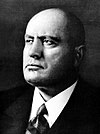
|
Ettore Caviglia (1880-1951) |

|
Aldo Aurelio Tassinari (1893-1946) |
National Party for Revolution and Resurgence | |||||
Community of Nations Mandate for Etruria (1946-1948)
| No | Picture | Name | Tenure | ||||
|---|---|---|---|---|---|---|---|
| 10 | File:SeanFitzgeraldEtruria.jpg | Seán Fitzgerald (1915-1961) |
- | August 25 1946 |
1 January 1948 | ||
| Appointed Director-General of the Mandate for Etruria by the Community of Nations to oversee reconstruction and the implementation of a new constitution and democratic system. Besides the International Criminal Tribunal for the Solarian War, significant number of Etrurian officials and military commanders reportedly involved in the war's atrocities escaped prosecution due to the pressure on Fitzgerald to preserve some aspects of the Etrurian state. He succeeded beyond expectations in restoring law and order, basic utilities and services and the smooth and peaceful transition back to democracy in the Etrurian general election of 1948. His other lasting legacy is the Fitzgerald Law, a legal work aimed at prohibiting the use of functionalist slogans, symbology and veneration of the ERR. It has since been amended and expanded to criminalise hate speech toward minorities. | |||||||
Second Republic (1948-1960)
| No | Picture | Name | Term | Tenure | Affiliation | ||
|---|---|---|---|---|---|---|---|
| 11 | 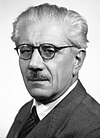
|
Giuseppe Zappella (1891-1989) |
- | 1 January 1948 |
10 July 1954 |
Democratic Action Party | |
| Focused and suceeded in leading a bi-partisan reform effort to improve the constitution, including the introduction of fixed five-year terms to avoid revolving door administrations. He was criticised however, for failing to prosecute military officers for the crimes committed by the CSRN regime. | |||||||
| 12 | 
|
Mauro Vittore Camillo (1897-1980) |
- | 10 July 1954 |
19 November 1957 |
Democratic Action Party | |
| Camillo focused primarily on further reconstruction, introducing numerous reforms to the economy, including the privatisation of numerous failing state-owned enterprises, while introducing mandatory education, as well as making it free-at-access. Greatly expanded the powers of the constituent state governments and the autonomous federal regions. Signed numerous agreements and treaties with Euclean states aimed at "promoting lasting peace." Issued a formal apology to Aquila for the Etrurian Occupation, but refused to do so for other states affected by the Solarian War, leading many pro-democracy movements to decry the remaining influences of the far-right. He resigned following the Raid on Positraiano. | |||||||
| 13 | 
|
Andrej Vidmar (1903-1989) |
- | 19 November 1957 |
4 July 1959 |
Democratic Worker's Party | |
| Vidmar was the first Carinthian and left-wing politician to become President. His government dramatically overhauled the national healthcare system, introducing government subsidised health insurance for the poorest, elderly, veterans and single-parent families. His government also introduced a federal ban on capital punishment, increased the transparency of the Civil Security Service, while also directing it to confront ultra-nationalist groups, including pro-independence groups in Novalia and Carinthia. His time in office was later dogged by rising nationalism in Novalia and Carinthia, culminating in the Great Uprising (1967-1971), He was succeeded by retired military general Massimo Bartolucci. | |||||||
| 14 | 
|
Massimo Bartolucci (1904-1978) |
- | 4 July 1959 |
4 May 1960 |
Democratic Worker's Party | |
| Bartolucci's short tenure struggled to confront the dramatic violence gripping western Etruria. He failed to secure cross-party support for a moderate and negotiation based response to the violence. He voluntarily ceded power to the military, which established the Supreme Council for Order and Peace. | |||||||
Etrurian Military Government (1960-1983)
| No | Picture | Name | Term | Tenure | Affiliation | ||
|---|---|---|---|---|---|---|---|
| 16 | 
|
Capo di stato maggiore dell'Esercito Etruriano Francesco Augusto Sciarri (1908-1998) |
7 | 4 May 1960 |
1 July 1974 |
Military | |
| As Chief of the Supreme Command, he assumed control of Etruria following the establishment of the Supreme Council for Order and Peace. He immeidately set about deploying over 80,000 soldiers to Carinthia and Novalia, while introducing expansive powers to confront separatism. His government is blamed for the deaths of up to 5,000 people in extra-judicial killings and mass executions, while he is credited with crushing the uprising in 1971. | |||||||
| 17 | File:Giovanni Aurelio Brocco.jpg | Capo di stato maggiore dell'Esercito Etruriano Giovanni Aurelio Brocco (1915-1990) |
8 | 1 July 1974 |
1 July 1978 |
Military | |
| Brocco succeeded Sciarri and focused much of his efforts on confronting the separatist and terrorist movements. He is credited with the defeat of Ariot groups operating in Tarpeia and southern Novalia, while is also accussed of stepping up state-repression, along with the being the mastermind behind Operation Giaguaro which led to the murder of over 100 people abroad. | |||||||
| 18 | File:Alteiri.jpg | Capo di stato maggiore dell'Esercito Etruriano Gennaro Aurelio Altieri (1916-2003) |
8 | 1 July 1978 |
1 July 1983 |
Military | |
| Succeeded Sciarri as head of the military and Etruria. He refused to dismantle the CSOP regime claiming "terrorism and separatism" was still gripping the western regions of Etruria. He however, used his government to introduce economic reforms, tax reform and improved education. His government is credit with the "Rinascita Economica" (Economic Resurgence) which saw annual growth rates of 5-6% from 1974 until 1985. His tenure also saw greater authoritarianism toward critics and pro-democracy activists. However, by the late 1980s, with the decline in activity by separatist forces, he began to negotiate with the pro-democracy movement and ultimately handed power back to civilians following the 1983 general elections. | |||||||
Third Republic (1983-present)
| No | Picture | Name | Term | Tenure | Affiliation | ||
|---|---|---|---|---|---|---|---|
| 19 | 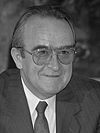
|
Miloš Vidović (1929-2001) |
10 | 1 July 1983 |
7 July 1988 |
Etrurian Socialist Party | |
| The first Novalian President of Etruria. His government focused on improving political and constitutional rights for Novalia and Carinthia, while reforming education to ensure higher-quality teaching of the "Three National Languages". His refusal to investigate crimes committed by the CSOP regime was highly controversial, his government failed to reform the country's voting system from first past the post to proportional representation in the hope of expanding democratic representation. His government and the PES was defeated in the 1988 election. | |||||||
| 20 | 
|
Vincenzo Biava (1937-2012) |
11 | 7 July 1988 |
7 July 1993 |
Etrurian Federalist Party | |
| - | 7 July 1993 |
19 September 1995 | |||||
| Biava was elected on a economy-focused agenda. His government greatly reduced the power and influence of the trade union movement across the Federation, launched a major privatisation programme, ending government control over water, electricity, gas and coal. Introduced neo-liberal reforms to the wider economy and reformed the social-housing system, to allow for tenants to buy their state-owned homes. Efforts to privatise telecommunications, railways and the national post office, however failed. Biava resigned following a scandal involving an illegitimate child and extra-marital affairs. | |||||||
| 21 | 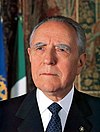
|
Nicolò Grassi (1924-2015) |
12 | 7 July 1993 |
2 July 1998 |
Etrurian Federalist Party | |
| - | 2 July 1998 |
1 April 1999 | |||||
| Grassi succeeded Biava as a pro-EC figure. His government was dominated by efforts to reform the economy, justice system and business environment in hope of securing membership of the community. His government also launched several major investigations into organised crime ties to the federal government, while he also came out victorious in the Ossuccio Crisis; successfully removing Eugenio Turelli as President of Ossuccio following the latter's anti-democratic policies. However, factional infighting in the Federalist Party over EC membership resulted in a vote of no-confidence and a snap election, in which he and the PEF were defeated. | |||||||
| 22 | 
|
Vinko Begović (1938-) |
13 | 1 April 1999 |
1 July 2004 |
Etrurian Socialist Party | |
| 14 | 1 July 2004 |
3 July 2008 | |||||
| Begović won the 1999 snap-election with a landslide for the PES, enabling him to undo several of the most unpopular reforms conducted by Biava and Grassi. His government however, continued the pro-EC reforms and worked to improve bi-lateral relations with Gaullica, Glytter and Norday. His government expanded health-insurance subsidies to greater number of people, including offering free health-care to children aged between 0-16. His government also sought to reduce the level of influence of the Solarian Catholic Church and proposed progressive policies regarding the LGBT community and Abortion. This led to running confrontations with the Catholic clergy and social-conservative parties. The Begović government also launched the "Verde e Pulito" programme, which aimed to increase green-energy production by 50%. His party lost the 2008 election due to growing government debt and inefficiencies. | |||||||
| 23 | 
|
Urbano Onofrio (1946-) |
15 | 1 July 2004 |
2 July 2009 |
Etrurian Federalist Party | |
| - | 2 July 2009 |
25 February 2011 | |||||
| Onoforio's government focused initially on initiating an austerity programme to reduce government debt brought about by the Socialist Party government. This included reforms to healthcare that increased the role of private healthcare companies, while a complete privatisation of dental care took place, covered by government oversight. Onoforio limited the pace of pro-EC reforms owing to continued factional opposition to membership. His government launched a $5.5 billion infrastructure improvement programme, including the construction of new roads, tunnels and bridges to modernise the interior. He was forced to resign after it was discovered he used his position to protect his brother from investigation for ties to the mafia. | |||||||
| 24 | 
|
Emiliano Reali (1974-) |
16 | 2 July 2009 |
2 July 2013 |
Etrurian Federalist Party | |
| - | 2 July 2013 |
7 July 2016 | |||||
| Reali succeeded Onoforio as youngest political to hold the Presidency. His government between 2009 and 2013 focused on social progressive policies, including the loosening of immigration controls, weakening of the religious restrictions against Orthodox churches. He signed numerous Treaties of Agreement with EC memberstates, including a Treaty of Friendship and Understanding with Gaullica. He officially apologised for the colonisation of Denikert and the abuses committed during the Denikert War of Independence, while his government also launched formal investigations into the CSOP Regime and the Mancano 3.000. In 2012 he announced that a referendum would be held on membership of the EC. His government lost the EC referendum in 2016. He resigned on July 7 2016. | |||||||
| 25 | 
|
Andrea Salvini (1963-) |
- | 7 July 2016 |
11 August 2016 |
Etrurian Federalist Party | |
| Succeeded Reali as a caretaker president, however a collapse in his party resulted in a snap election in August, in which the Tribune Movement won by a landslide. Salvini stands as the shortest reigning President at just one month in office. | |||||||
| 26 | 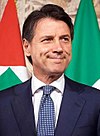
|
Francesco Carcaterra (1969-) |
- | 11 August 2016 |
Incumbent | Tribune Movement | |
| First politician from a non-mainstream party to become President. As leader of the "No" campaign during the referendum, his government abolished numerous pro-EC bodies and officially ended the EC Reform Programme. Led numerous referendums including the First Constitutional Reform Referendum, Etruria Capital Punishment referendum, 2016 and the Second Constitutional Reform Referendum. The first constitutional referendum resulted in the granting of new powers previously not held by the Presidency. | |||||||
